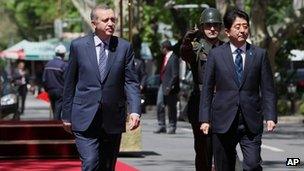Japan signs Turkey nuclear deal
- Published

The Turkish government has signed a deal with a Japanese-French consortium to build a new nuclear power station.
The $22bn (£14bn) contract is Japan's first successful bid for an overseas nuclear project since a tsunami wrecked the Fukushima power station.
The deal was signed by visiting Japanese Prime Minister Shinzo Abe.
Turkish Prime Minister Recep Tayyip Erdogan said it would transform relations with Japan into a "strategic partnership".
"What happened at Fukushima upset all of us. But these things can happen. Life goes on. Successful steps are being taken now with the use of improved technology," the Turkish prime minister added.
The deal comes as part of renewed efforts to promote Japanese nuclear technologies abroad, despite concerns over safety.
One of the Japanese firms included in the consortium is Mitsubishi Heavy Industries, one of the companies behind the Fukushima plant damaged in the 2011 earthquake and tsunami.
Turkey is also prone to earthquakes, and the government cited Japan's expertise in earthquake protection as one of the factors in signing the deal.
The other firms are Itochu Corporation and French utility group GDF Suez.
Japan is looking to boost exports of its technological expertise as it attempts to increase economic growth and escape two decades of near stagnation.
Fast-growing Turkey, meanwhile, is planning to invest in domestic energy generation to reduce its dependence on imports as the economy expands.
The new nuclear plant will be Turkey's second. It is currently dependent on imported oil and gas to meet 97% of its energy needs.
- Published11 March 2013
- Published22 August 2023
- Published26 July 2023